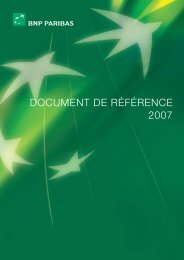2007 REGISTRATION DOCUMENT
2007 REGISTRATION DOCUMENT
2007 REGISTRATION DOCUMENT
- No tags were found...
Create successful ePaper yourself
Turn your PDF publications into a flip-book with our unique Google optimized e-Paper software.
RISK MANAGEMENTRisk factors 3< Contents >RISKS R ELATED TO THE B ANK AND ITS I NDUSTRYADVERSE MARKET OR ECONOMICCONDITIONS MAY CAUSE A DECREASE IN NETBANKING INCOME OR PROFITABILITYAs a global financial institution, the Bank’s businesses are highly sensitiveto changes in the financial markets and economic conditions generally inEurope (especially in France and Italy), the US and elsewhere around theworld. Adverse changes in market or economic conditions could, however,create a challenging operating environment for financial institutionsin the future. Such adverse changes could result, in particular, fromincreases in commodities prices (including oil), increases in interest rates,adverse geopolitical events (such as natural disasters, acts of terrorismand military conflicts), or a deterioration in credit market conditions.The Bank faces a number of specific risks, with respect to adverse futuremarket or economic conditions. Financial markets in France, in Europeand elsewhere may decline or experience increased volatility, whichcould lead to a decline in capital markets transactions, cash inflows andcommissions from asset management. Adverse economic conditionscould reduce demand for loans by corporate borrowers or increase therate of defaults by borrowers. These developments would adverselyaffect the Bank’s net banking income, and, if it were unable to reduceexpenses commensurately, its profitability. Revenues and profitabilitycould also be depressed by market losses in the Bank’s securities portfolioor proprietary positions, all resulting from adverse market or economicdevelopments.THE BANK MAY INCUR SIGNIFICANTLOSSES ON ITS TRADING AND INVESTMENTACTIVITIES DUE TO MARKET FLUCTUATIONSAND VOLATILITYThe Bank maintains trading and investment positions in the debt,currency, commodity and equity markets, and in private equity, propertyand other assets. These positions could be adversely affected by volatility,i.e. the degree to which prices fluctuate over a particular period in aparticular market, regardless of market levels. Volatility trends thatprove substantially different from the Group’s expectations may alsolead to losses relating to a broad range of other trading and hedgingproducts the Bank uses, including swaps, forwards and futures, optionsand structured products.To the extent that the Bank owns assets, or has net long positions, in anyof those markets, a market downturn could result in losses from a declinein the value of its positions. Conversely, to the extent that the Bank hassold assets that it does not own, or has net short positions, in any ofthose markets, a market upturn could expose it to potentially unlimitedlosses as it attempts to cover its net short positions by acquiring assetsin a rising market. The Bank may from time to time have a tradingstrategy of holding a long position in one asset and a short position inanother, from which it expects to earn net revenues based on changesin the relative value of the two assets. If, however, the relative value ofthe two assets changes in a direction or manner that the Bank did notanticipate or against which it is not hedged, the Bank might realize aloss on those paired positions. Such losses, if significant, could adverselyaffect the Bank’s results of operations and financial condition.THE BANK MAY GENERATE LOWER REVENUESFROM BROKERAGE AND OTHER COMMISSION-AND FEE-BASED BUSINESSES DURINGMARKET DOWNTURNSMarket downturns are likely to lead to a decline in the volume oftransactions that the Bank executes for its clients and, therefore, to adecline in its net banking income from this activity. In addition, becausethe fees that the Bank charges for managing its clients’ portfolios arein many cases based on the value or performance of those portfolios,a market downturn that reduces the value of its clients’ portfolios orincreases the amount of withdrawals would reduce the revenues the Bankreceives from its asset management and private banking businesses.Even in the absence of a market downturn, below-market performanceby the Bank’s mutual funds may result in increased withdrawals andreduced inflows, which would reduce the revenues the Bank receivesfrom its asset management business.A LONG TERM MARKET DECLINE CAN REDUCELIQUIDITY IN THE MARKETS, MAKING ITHARDER TO SELL ASSETS AND POSSIBLYLEADING TO MATERIAL LOSSESIn some of the Bank’s businesses, long term market movements,particularly asset price declines, can reduce the level of activity in themarket or reduce market liquidity. These developments can lead tomaterial losses if the Bank cannot close out deteriorating positions ina timely way. This is especially the case for assets which enjoy limitedliquidity. Assets that are not traded on stock exchanges or other publictrading markets, such as derivatives contracts between banks, may havevalues that the Bank calculates using models rather than publicly-quotedprices. Monitoring the deterioration of prices of such assets is difficultand could lead to unexpected losses.SIGNIFICANT INTEREST RATE VARIATIONSCOULD ADVERSELY AFFECT THE BANK’S NETBANKING INCOME OR PROFITABILITYThe amount of net interest income earned by the Bank during anygiven period significantly affects its overall net banking income andprofitability for that period. Interest rates are sensitive to many factorsbeyond the Bank’s control. Changes in market interest rates could affectthe interest rates charged on interest-earning assets differently than theinterest rates paid on interest-bearing liabilities. Any adverse change inthe yield curve could cause a decline in the Bank’s net interest incomefrom its lending activities. In addition, maturity mismatches and increasesin the interest rates relating to the Bank’s short-term financing mayadversely affect the Bank’s profitability.1234567891011<strong>2007</strong> Registration document - BNP PARIBAS 71
















